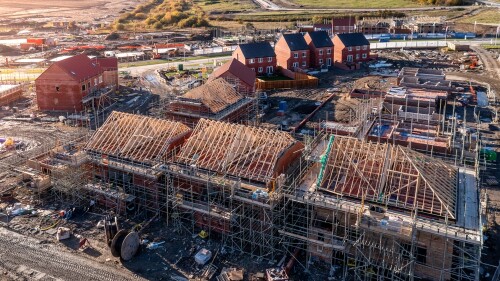Resilience and Sustainability
The ULI Net Zero Imperative (NZI) is ULI’s multiyear initiative to accelerate decarbonization in the built environment and advance the organization’s net zero mission priority. Implemented by the ULI Lewis Center for Sustainability in Real Estate, key programs include Technical Assistance Panels (TAPs), which are intense three-day engagements during which a panel of ULI member experts and partners help clients or sponsors, often local governments, think through strategies for advancing their net zero goals.
The new ULI report explores how developers can find both profit and purpose by embracing the potential of existing buildings, illustrated through three case studies that generated tangible value for communities and investors alike.
Top 10 takeaways from ULI’s Health Leaders Network Alumni Convening in the Netherlands
A panel of sustainability experts recently gathered at the 2025 ULI Resilience Summit in Denver to discuss how the insurability of affordable housing can be greatly enhanced by using resilient construction.
At the Urban Land Institute’s 2025 Spring Meeting in Denver, real estate leaders gathered to share critical lessons learned from the catastrophic wildfires that ravaged Los Angeles in January. The panel, “Rebuilding Resilience: A Conversation with Leaders on Lessons from the Los Angeles Wildfires,” emphasized the importance of swift disaster response and collaborative approaches, as members unveiled the influential Project Recovery: Rebuilding Los Angeles After the January 2025 Wildfires report, which they hope will serve as a blueprint for other cities facing disasters.
In the aftermath of January’s devastating Eaton and Palisades fires, Los Angeles faces a daunting challenge: how to rebuild not only homes but also the infrastructure that underpins entire communities—from water and electrical distribution systems to damaged sewers and streets to community essentials such as trees, parks, and libraries. The scale of the infrastructure challenge is immense.
ULI has launched C Change for Housing, a major new pan-European program designed to mobilize the real estate industry around two of society’s most urgent and interconnected challenges: the climate crisis and housing affordability.
As practitioners in the industry, we can all too easily reduce our thoughts about housing to the practical machinations of our work. Decisions are often made to serve regulatory agencies and capital providers, and to find the cheapest and fastest path to completion. We mustn’t lose sight of the fact that our job is to create places that serve real-life human needs.
Experts encourage the creation of community rebuilding authorities and
other measures to ensure the best-case scenario for recovery after January’s wildfires
other measures to ensure the best-case scenario for recovery after January’s wildfires
Nestled in the forested hills west of Napa Valley, Enchanted Hills Camp—which is owned by LightHouse for the Blind and Visually Impaired—has provided unparalleled recreational opportunities and skills training for blind and low-vision campers of all ages since 1950. After the devastating Napa wildfires of 2017 destroyed more than 25 structures and in excess of 900 trees on the property, the camp was not only rebuilt but also reimagined.










